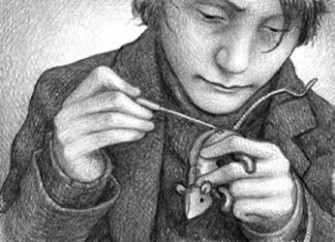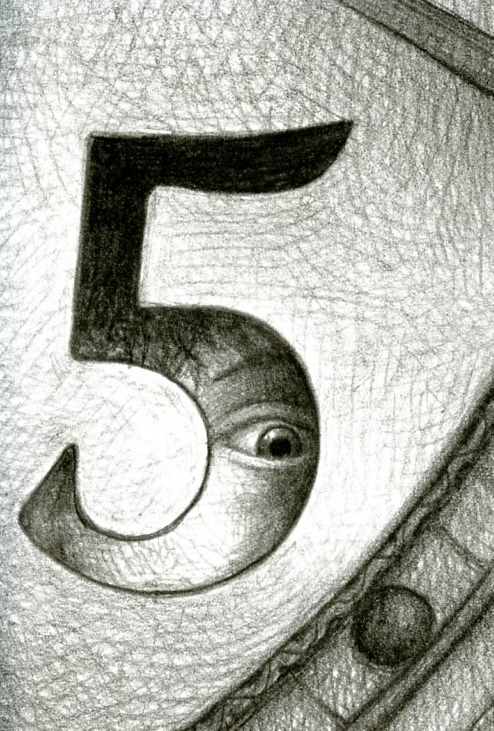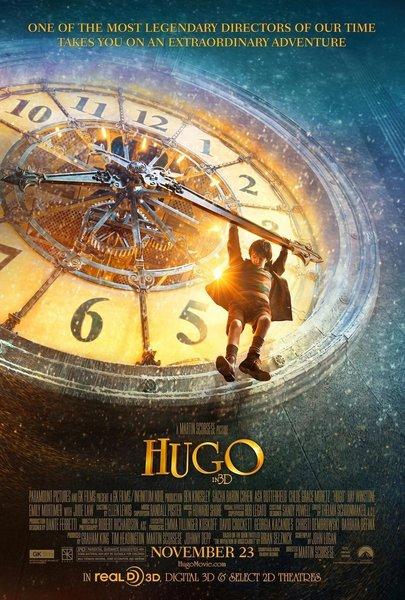
The story is told through both words and detailed sketches. The pictures do not act as visual aids, but rather, take over telling the story throughout most of the book. This technique precious, incredible and absolutely awe-inspiring for any book lover, regardless of age. (Click on the link for a cover to cover look at the book)
Even more recently, however, Martin Scorcese brought the book to life with a film adaptation simply titled Hugo, which earned the director an award at this year's Golden Globes. Happy at the time that a seasoned director earned an award for a film based on a book that I loved, I was deeply disappointed when no less than five minutes into watching the movie, significant details from the book had already been scrapped to make way for new and useless information.


A) Note to the filmmaker: there is no need to write out an integral character just to make room for a new (and pointless) character in the film. Scorcese, the Station Guard did not have a girlfriend in the book, nor did he need one.
B) Hugo, when looking out of the huge clock at the train station, looks out of the number '5' in the book - not the number '4'!

C) Isabelle didn't break her leg and Hugo didn't break his hand. Furthermore, Isabelle was so annoying in this film that I passionately wanted her to break her leg.
D) Hugo and Isabelle do not flirt or have feelings for each other in the book! Why then do they hold hands so early on in the film and why does Hugo look at her long
ingly when they are at the cinema?
E) Isabelle does not narrate the final page of the book, so why then does her narration suddenly take over the final seconds of the film? The film is called HUGO, not Isabelle! She didn't narrate anywhere else in the film so this just makes no sense whatsoever.
F) Hugo does not have a dream that he is an automaton!
G) While dreaming, when Hugo finds a mysterious key on the train tracks (which, of course, does not occur in the book), a close up shows us that the key is par
tially covered by gravel. In the very next shot, it is sitting on the wooden track. Whoops!
H) Hugo never risks his life by hanging off the giant clock hand. This is just ridiculous. Clearly, the writers thought it would be clever to pay tribute to the black and white film 'Safety Last' which is mentioned and depicted in the book. On film? It just doesn't work.
I) Way too much time was spent developing a painful new addition to the story. The Station Guard's little war story and why his leg brace squeaked was a time killer and his crush on the young lady who sells the flowers was unnecessary. Such time
should have been spent mastering Hugo Cabret's onscreen persona. Hugo is troubled and doesn't trust others. Why then is he suddenly holding hands with an irritating girl he just met and sharing his painstakingly private secrets with her?
J) Hugo's father died in the museum attic when the fire broke out, yes. But the automaton was with him during the fire, not at home with Hugo! Hugo later sal
vages the tattered automaton from the wreckage of the fire that had been sitting there, untouched for a long time. His discovery of the automaton was a magical moment in the book. Why wasn't this displayed in the film?
K) The Station Guard was NOT comical in the book. Sacha Baron Cohen, I'm sure just following direction, was silly and distracting as said character.
L) Mama Jeanne never gave Isabelle the love heart key. Isabelle stole it from her, which is integral to how she and Hugo continue to develop their friendship.
M) Hugo stole the love heart key from Isabelle while she was wearing it, hugging her as a distraction while he stole the necklace. She did not offer her necklace in order for the automaton to work.
N) In the book, Etienne is a handsome young man with an intrigu
ing eye patch who is kind to the children. He is integral in solving the mystery of Papa Georges' past time and the role of the automaton. He does not appear at all in the film.
O) Hugo does not willingly show Isabelle his automaton. She invites herself in, demands he let her see what he is doing, will not leave, and then gets a
ngry when the automaton signs Papa Georges' name as she thinks that Hugo stole it from him!
P) In the book, Hugo is often found rubbing the cover of his father's diary or rubbing the buttons on his jacket (kind of like a security blanket or seeking comfort, almost like a nervous twitch). I didn't notice this at all in the film.
Q) Hugo does not pick the l
ock of the jail cell that he is placed in after the Station Guard catches him. The Guards open the cell and Hugo quickly pushes through, escaping and running for h
is life! Another mistake in the movie.
R) In the book, Etienne gives Hugo a coin (from behind his eye patch) to pay for the book he was about to steal. It is called Practical Manual of Card Magic and Illusions, not Robin Hood! Honestly, who writes these screenplays??!!
S) Madame Emile and Monsieur Frick are overheard by Hugo in the train station talking about his Uncle's suspicious death. Hugo then drops the bottle of milk he is holding, exposing him and thus getting him caught by the Station Guard. In the movie, however, the Station Guard's dog spots him while his owner tells his newfound crush about Hugo's uncle's body being discovered on the river bank.
T) Madame Emile and Monsieur Frick do not have a romance in the book! This is just awkward, pointless and confusing on film. Also, neither should have dogs.
U) In the book, Papa Georges explains to Isabelle that her moth
er and father worked for him and were dear friends of his, which is one reason he couldn't look at pictures and film reels from his past without feeling deep guilt, sadness and despair. This wasn't touched upon in the film, though given the chance.
V) The sound of shoe heels clicking isn't focussed on at all in the film, though it is an important factor in the book which hints towards an important explanation later on.
W) Papa Georges does not teach Hugo card tricks while they work in the toy booth. Hugo only ever watches Papa Georges out of facination and feels as if he wants Hugo to see them. They never interact like a father and son in the book, though they do in t
he film (and rather quickly, mind you)!
X) In the book, Papa Georges gives Hugo a magician's name: Professor Alcofrisbas. This part is skipped in the film. Hugo is seen playing one card trick in a blink-and-you'll-miss-it panning shot, before the camera quickly turns to Isabelle, who narrates the final scene. Weird.
Y) In the book, when Madame Emile and Monsieur Frick discuss Hug
o's uncle's death, they wonder how the clocks continue to work in the Train Station, speculating that it is his ghost that continues to manage the clocks (unaware that it is actually Hugo). This doesn't happen in the film and the fact that he has been left with the responsibility of running all the clocks in the Station isn't entirely clear.
Z) The term 'ghosts' wasn't used to intrigue and mystify as it was in the book. It was used once by Papa Georges when he first sees Hugo's notebook, and is then forgotten about for the remainder of the film.
I suppose the movie poster should have given me an indication of how little the film adaptation would respect the events within the book...

In terms of the original story, we cannot forget that The Invention Hugo Cabret by Brian Selznick is a fictional tale in terms of the characters, yet highly based on facts surrounding the first films ever made. Selznick did his homework and endeavored to write (and draw) a book that paid homage to the first filmmakers in Europe, an
d respectfully cites the film images or titles used in his masterpiece of a storybook at the very end, like a well-written essay would list its own references.
For book and film lovers, this book is an absolute treasure. How Martin Scorcese managed to stuff it up is beyond me.

Please, if you enjoyed the film, leave a comment and give your point of view. Likewise, if you agree that the movie did not live up to your expectations, tell me why. Thanks for reading!
Also, I should note that my sister, who will remain nameless, helped me to find fault in this film. Therefore, this blog was written by the both of us.
ReplyDelete